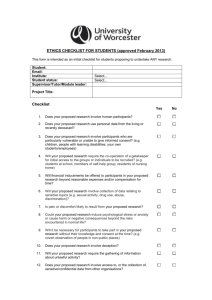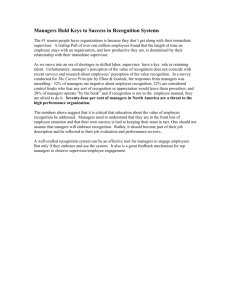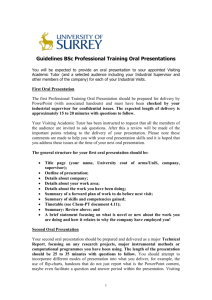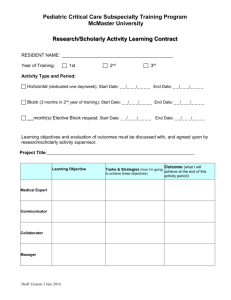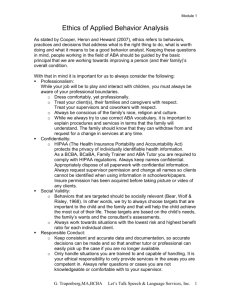Independent Study Guide/Template
advertisement
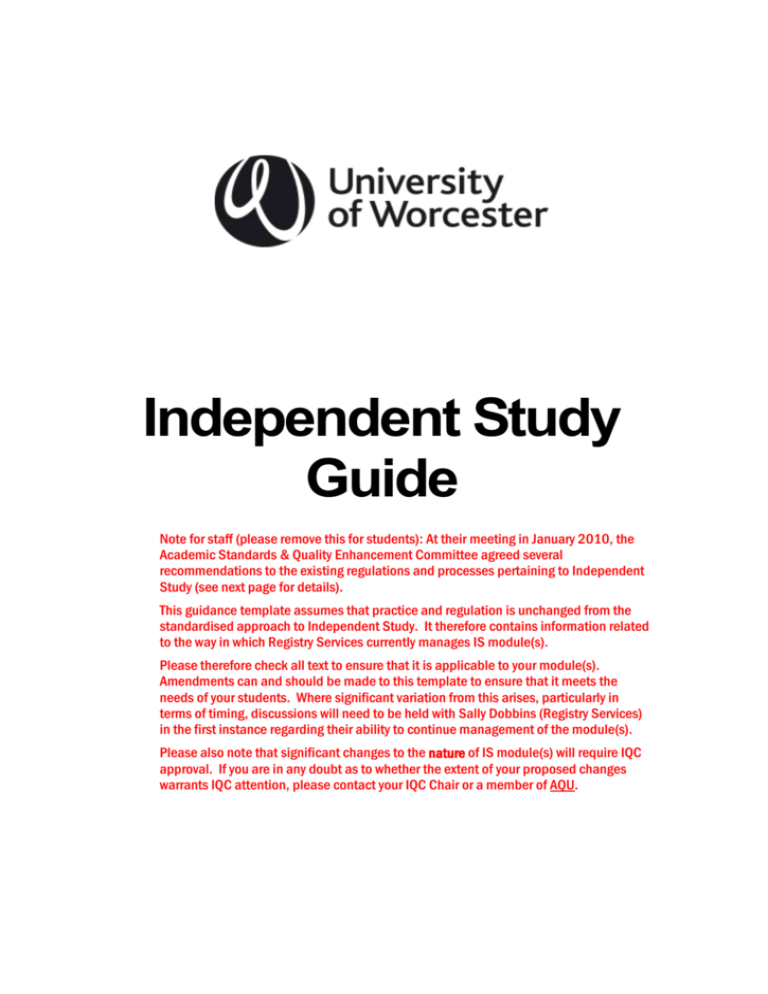
Independent Study Guide Note for staff (please remove this for students): At their meeting in January 2010, the Academic Standards & Quality Enhancement Committee agreed several recommendations to the existing regulations and processes pertaining to Independent Study (see next page for details). This guidance template assumes that practice and regulation is unchanged from the standardised approach to Independent Study. It therefore contains information related to the way in which Registry Services currently manages IS module(s). Please therefore check all text to ensure that it is applicable to your module(s). Amendments can and should be made to this template to ensure that it meets the needs of your students. Where significant variation from this arises, particularly in terms of timing, discussions will need to be held with Sally Dobbins (Registry Services) in the first instance regarding their ability to continue management of the module(s). Please also note that significant changes to the nature of IS module(s) will require IQC approval. If you are in any doubt as to whether the extent of your proposed changes warrants IQC attention, please contact your IQC Chair or a member of AQU. Extract from Academic Standards and Quality Enhancement Committee: January 2010 30.01 The Committee discussed in some detail the paper arising from Institutes’ consideration of the recommendations of the thematic audit of policy and practice on the appropriateness and management of independent study in honours degree programmes, and agreed that the feedback indicated a more flexible approach for courses and subjects was required. It was agreed that curricula and assessment strategies need to be able to demonstrate alignment with the FHEQ, and with subject benchmark statements, some of which do have specific expectations about carrying out extended independent research. This does not, however, necessitate a standard requirement for a ‘dissertation’ or similar independent piece of extended work across all subject areas. 30.02 The Committee agreed the following: The requirement for a 30 credit mandatory independent study module in all undergraduate Hons degree programmes be removed; Courses/subjects that wish to make an independent study module (or similar) optional or provide a programme that does not include such a module, will need to demonstrate how the programme meets the expectations of the FHEQ and the relevant subject benchmark statement(s); guidance will be produced by AQU on the process and documentation requirement for a change of approval Courses/subjects that wish to retain an ‘independent study’ module may use alternative titles for the module (eg research project, exhibition, performance, etc) and also may use modules of different sizes. 30.03 Given a more flexible and varied approach to the design of level 6 Hons degree, it was also agreed it would not be appropriate to set requirements or expectations relating to assessment strategies or levels of supervision. Moreover, the needs of direct entry students also had to be taken into account. Accordingly it was agreed: Where students undertake a 30 credit independent study/research project or similar module, a notional 4 hours of supervision is appropriate Students who wish to complete a 30 credit independent study/research project module in a single semester will need to obtain approval from their nominated supervisor – this specifically applies to progressing students rather than direct entry students, where arrangements are already in place to support students completing work over a single semester Institutes must ensure policy and practice includes consideration of the ethical implications of research practice and appropriate approval of research proposals. 30.04 Following discussion regarding the current arrangements for the submission of independent study proposals and final work, through the systems managed by Registry Services, it was agreed: Central administration, through Registry Services, of arrangements for the submission of assessment items related to independent study/research project modules would remain in place, although individual subject areas may choose to opt out. 30.05 In the light of the above conclusions, the Committee also agreed: There should no longer be a generic student guide for independent study – from 2010/11 all subjects will produce their own guide; AQU will provide guidance/standard text etc to support this That the provision for the option of the 30 credit independent study module should apply for final year students from 2011/12 That further consideration should be given to the implications of these changes for students following joint pathways. The Independent Study The Independent Study requires you to display evidence of your ability to work independently in both researching and presenting a topic of your own choice, and to sustain these skills in an extended exercise. Among those skills is the ability to plan and complete a substantial piece of work within the set deadlines. The Independent Study must be passed for the award of an honours degree. If you wish to complete a 30 credit independent study project module in a single semester you will need to obtain approval from your nominated supervisor – this specifically applies to progressing students rather than direct entry students, where arrangements are already in place to support students completing work over a single semester. The following information is designed to guide you through the process of submitting an Independent Study. A flowchart, outlining the key steps, can be found at the end of the Handbook. Choosing a topic You should discuss your proposals with your tutors, and you will be allocated a supervisory tutor once the general area of your study is known. All topics require approval; part of that approval will relate to the University’s ability to supervise and assess your Study fairly - if you are proposing to study an area where our staff are not expert, we may have to ask you to think again. The Form of the Independent Study You should negotiate with your supervisor to ensure you adopt a suitable approach to the Independent Study (eg. performance, dissertation, video) and one which will enable your work to fulfil the aims and objectives of the module(s). Identifying and agreeing a topic This MUST be done in the second semester of the academic year before the Study itself is begun. This applies to ALL Studies and all students, whether you intend to start the work in semester 1 of the next year or in semester 2. This may seem a long time in advance, particularly for Studies taking place in semester 2 of the next year, but we need to identify your supervisor in the spring semester of the year before your Study irrespective of which semester you will actually require supervision. Devising a topic The first stage in your Study is to identify the general topic you want to investigate and the particular approach you want to adopt to it. You should develop rough ideas yourself and then discuss them with one of your tutors. At this stage, you should approach a tutor who you think will be able to help you - formal allocation of a supervisor comes later. You should collect an Independent Study Proposal Form from Registry or download it from the Registry Services webpage, and arrange to meet the tutor. It is your responsibility to arrange this meeting. Getting support for your Proposal Do this no later than week 8 of semester 2, prior to entering your final year. The Independent Study Proposal Form requires a tutor’s signature to indicate that you have discussed your ideas with her or him and that she/he thinks the topic is realistic. You should also complete the ethics checklist, and discuss any ethical issues or health and safety requirements which your topic may raise at this meeting. The tutor you consult should teach in a Subject relevant to your proposed topic. Students intending to take their Study across two Subjects should discuss the topic with a tutor from each Subject (and get two signatures), unless the tutor concerned teaches in both Subjects involved. Please note: the tutor’s signature indicates support for your Proposal, not approval of it. Ethical Issues/Health and Safety requirements It is the responsibility of every student and member of staff to ensure that the work they carry out is within the University Guidelines for Ethical Conduct. All students must complete the ethics checklist attached to the proposal form. If your study will involve you working with other people, for example conducting a survey among other students or members of the general public, or investigating an organisation, you must respect their rights; this includes the right to confidentiality and the right to give and withdraw consent to participate in the study. If your work involves you in gathering data from those in positions of vulnerability, such as clients in care, prisoners, ex-offenders or children, consider carefully how voluntary consent might be achieved. Can you ensure that participants will not be worse off following your study than they were before they agreed to help? Can you ensure that any problems they might have will be treated with the necessary sensitivity? Similarly, if your work impacts on the environment, involves research into illegal activities, or working with animals, you must consider the ethical implications very carefully. This statement should be included on any information you distribute to research subjects: If you have a concern about any aspect of this study you should ask to speak to the researcher(s) who will do their best to answer your questions [insert contact number]. If you remain unhappy and wish to complain formally about any aspect or about the way you have been dealt with during the study, you can do this through contacting the Secretary to the University of Worcester Ethics Committee, Mr Kevin Pickess, on (01905) 857536. For studies coming within the regulations regarding Criminal Record Check (for example if you need to visit a crèche, nursery, school or work with any agency involving children or vulnerable adults), it is a requirement that you apply for a Check through the Criminal Records Bureau. Guidance notes on how to obtain a Disclosure package are available from the Student Records Office, Registry Services. For studies involving experimentation, there will be Health and Safety considerations to be taken into account. It may be necessary to complete a Control of Substances Hazardous to Health (COSHH) assessment before commencing. (Your supervisor will advise you if he/she feels this is necessary). Students should give consideration to their own safety and well being, with specific regard to any risk factors that may be incumbent within the proposed study. Procedures for Independent Studies Involving Ethical Issues INDEPENDENT STUDY FORM (OR EQUIVALENT) INDEPENDENT STUDY CO-ORDINATOR DEPARTMENT REVIEW FOR ETHICAL CONSIDERATIONS No ethical issues OR ethics clearly addressed Involves patients (access through NHS) Areas of concern OR health professionals Modify or reject proposal Monitor (supervisor) Relevant NHS/Trust Monitor (supervisor) Resubmit Independent Study Form. If further concerns, REFER TO ETHICS COMMITTEE (see over page) Referring Independent Study Proposals to Ethics Committee In the event that staff or students are concerned about ethical issues raised by an independent study, and where it has not been possible to resolve ethical issues via departmental scrutiny, the proposal should be referred to the University Ethics Committee. The Committee aims to ensure that research procedures do not endanger the safety or wellbeing of the subjects/researchers, or undermine public confidence in the conduct of research. It also aims, therefore, to safeguard volunteers and the reputation of the University. Ethics Committee can be contacted in the first instance via the Student Records Office, Registry Services. Proposals being referred to Ethics Committee for consideration should be accompanied by the Ethics Committee Consideration of Research Proposal proforma, where you should give full details of the proposed study. (These forms can be obtained from the Student Records Office, Registry Services, or the Registry Enquiries Desk). The proforma should be completed by the student/staff member conducting the research, signed by the Supervising Tutor, and returned to the Registry Enquiries Desk. This should be accompanied by a department referral form, to be completed by the appropriate department, indicating why the research proposal is being forwarded for consideration by the University Ethics Committee. (Departments can obtain this form from the Student Records Office, Registry Services). These papers will be forwarded to members of the Ethics Committee in time for consideration at the next scheduled meeting (see University Calendar). The proposal will be discussed by the Committee, and the Supervising Tutor may be invited to attend to assist the Committee in its deliberations. Comments and suggestions, which may include requests for further information or modifications to the proposal, will be forwarded to the Supervising Tutor and the student in writing. Supervising Tutors should ensure that proposals are submitted to the scheduled Committee meetings. In exceptional circumstances the Committee will consider proposals via Chair’s Action. To appeal against a decision made by the Ethics Committee regarding a research proposal, you should submit an appeal in writing (within 10 days of hearing from Ethics Committee) and forward it, together with any new supporting material, to the Secretary of the Ethics Committee (via Registry Services). This will be examined by the Registrar and the Chair of the Ethics Committee, and a final and binding decision will then be made. Submitting the Independent Study Proposal Form. Do this by the Monday of week 10 of semester 2, prior to entering your final year Completed Proposal Forms should be submitted to the Registry Enquiries Desk by the Monday of week 10 of the second semester of the academic year before your Study will begin. Please note that no Proposal Form will be accepted without a tutor’s supporting signature, and a completed ethics checklist. If you do not submit a Proposal Form by the deadline you will not normally be allocated a Supervisor and you may not be able to complete your Study at the time you intend. Allocation of supervisor and initial tutorial. When the topic is approved, the information provided on your Proposal Form is used to allocate a member of staff to be your supervisor for the Independent Study. You will be notified who your supervisor will be. You should then contact your supervisor and arrange an initial meeting. The initial meeting will help you to refine your ideas about your topic. In particular, if there are ethical issues or health and safety requirements involved in undertaking your Study, this meeting should consider them and develop a plan to ensure that these are resolved so you can begin your Study on schedule. Insurance If your Study requires you to work off-site (perhaps in a work placement or conducting research in another organisation or firm) you will require insurance cover while you are not on the University of Worcester campus. Employers Liability Insurance cover should be provided by the company/organisation you are working with – you should discuss this with them when arranging your work. Interim review meeting At some point during your Study (exactly when depends on how your Study is progressing) your supervisor will invite you to a formal Interim Review Meeting. This meeting is to check how things are going and to ensure that you have had the opportunity of receiving tutorial advice. The meeting will result in a formal statement of progress prepared by you and your supervisor, which will be placed on your file. Failure to complete your Interim Review could have serious consequences for your Independent Study. Change of Independent Study topic It is recognised that some revisions and amendment to Independent Study topics and titles may be required as research and writing proceeds. Once approval has been given, you should discuss any such requirements with your supervising tutor in the first instance. Broadly, relatively minor alterations can be approved by your supervisor, but major amendments may require the completion of a second Proposal Form and the formal approval process to be repeated. If major amendments include an alteration in the Subject in which the Independent Study is submitted or the balance between them, you will need to amend your Independent Study module registration accordingly; do so by arranging a meeting with a Programme Adviser. Writing your Independent Study It is important to work steadily at the Independent Study during the semesters in which you are taking it. You will not have the stimulus of regular class-contact in the same way as in other modules - it is your responsibility to manage your time and to work regularly and consistently. Remember, as with all modules, you are expected to devote around 10 hours per week study time to each of the Independent Study modules. This may help you to gauge the time to devote to it, alongside the other modules you will be taking. Ongoing supervision You should seek regular tutorial guidance to discuss your work as it develops. There is no simple rule for the frequency of tutorials, but you are entitled to a notional total of four hours supervision altogether [NB – this applies in the case of 30 credit modules only, and even then can be at Institute’s discretion]. The responsibility for making contact with your supervisor and arranging these tutorials is yours: make sure you take advantage of the specialist help and advice your supervisor can give you. Your supervisor will help you define the scope of your topic, locate or handle sources of information and assist you in developing the appropriate scholarly apparatus (references, bibliography etc.) which you will need. Your supervisor will also be able to discuss your ideas with you and help in your approach to difficult points. You should be prepared to submit regular drafts for your supervisor's comments. The relationship between you and your supervisor is an important one, and it is also important that both sides understand its limits. Your supervisor is a source of advice and assistance, but the Independent Study is your own independent project, and must reflect your own work. If you feel you are not receiving the guidance to which you are entitled, please discuss the matter with your supervisor and, if necessary, ask for the matter to be referred to the Independent Study Co-ordinator. If you remain dissatisfied, consider using the Student Complaints Procedure. You should not await your results to raise such issues but raise them as they occur. Please note that supervision concludes before the submission date for the Independent Study. Supervisors cannot be expected to make comments on drafts or to read whole Independent Studies at the last minute. Therefore, your right to supervision ceases on the Friday of week 10 of the semester in which your Study is to be submitted. Submitting the Independent Study As noted above, all Independent Studies must be submitted by 3pm on the Thursday of Week 12 of the semester in which you are taking the last of the two Independent Study modules. The completed Independent Study should be handed in to the Registry, not your supervisor or Reception. When it is submitted, you will be issued with a receipt. Number of copies required To facilitate double marking, two bound copies of the text of the Independent Study are required. Where an Independent Study contains illustrations such as photographs, a good photocopy of the illustrations will suffice in the second copy of the Study. Additionally, students are advised to keep a spare copy or copy of the final draft. Completed Independent Studies may normally be collected on Graduation Day. The University reserves the right to retain the second copy of the Independent Study for internal use. Mitigating Circumstances Because of its importance in your programme (in that the Independent Study is required to achieve an Honours degree), this is the only module for which extensions to the deadline may be requested. The planning and successful completion to the due date of the Independent Study is a fundamental part of the exercise; therefore extensions will only be granted where there are exceptional circumstances. Should you therefore require an extension, you will need to follow the Mitigating Circumstances process. Mitigation Circumstances are defined by the University as exceptional circumstances, outside of your control, that have affected your academic performance. The following represent grounds for the submission of a claim: Serious illness Serious illness of partner, relative or friend Bereavement Excessive employment demands which were substantial and temporary (part-time students only) Claims of exceptional mitigating circumstances should be submitted on the mitigating circumstances form before results are considered by the Board of Examiners and before the published deadline. Information on how to submit a claim of mitigating circumstances can be found via your SOLE page in the “My Course Details” tab. Full procedures and regulations regarding mitigation can be found through the above link. Cheating You will note that this Guide indicates that your Independent Study may arise from material or issues you have studied in your other modules. You may not use material you have presented for assessment in other modules in your Independent Study without substantial reworking of it. In particular, verbatim use in an Independent Study of work submitted for another assessment is considered to be a form of cheating, and will be treated as such. Registry Services pages include information on the nature of cheating, as defined by the University, which will help you avoid potential allegations. The linked document (.pdf) also outlines associated processes and penalties. Guidance on the presentation of the Independent Study This sets out some features which should be followed in the presentation of the Study. It is not intended as an exhaustive specification. Both copies of your Independent Study should be bound, and have a plastic back and a clear plastic cover. Media Services and the Students Union will undertake binding given good notice. All their formats can be assumed to be acceptable. (The Library and/or your department will have examples of bound Studies for you to see). Students wishing to bind their Independent Study in a more permanent form should obtain the permission of the Independent Study co-ordinator in the Subject(s) in which the study is placed. The Independent Study should have a title page giving the following information: (i) (ii) (iii) (iv) (v) The full title of the thesis; The full name of the author, followed, if desired, by any qualifications or distinctions; The qualification for which the Independent Study is submitted; The name of the University; The month and year of submission. Eg. Title of Independent Study Student’s Name Independent Study submitted as part requirement for the B.A. (or B.Sc) (Hons) degree in [Subject(s) .....] at the University of Worcester. (Month and Year)” By putting your name to the study you are indicating that it is essentially your own work and that you are not presenting it dishonestly. The Independent Study should be word-processed on A4 paper of good quality. Only one side of the paper should be used; margins should be as follows: Left (binding edge) and top margin Other margins 40mm 20mm Double (or one-and-a-half) spacing should be used except for indented quotations or footnotes where single spacing may be used. When submitting an Independent Study, the author should indicate in a suitable declaration any material contained in the thesis which may have been used before. If the thesis is based on joint research, the nature and extent of the author's individual contribution should be indicated. There should be an abstract of approximately 300 words; this should provide a synopsis of the thesis, stating the nature and scope of the work undertaken. Any abbreviations should be those in normal use. Where necessary a key to abbreviations should be provided. The order of presentation should be: Title page Abstract Table of contents Tables of illustrations or diagrams where appropriate Preface and acknowledgements List of abbreviations where appropriate Text Notes Appendices Bibliography Footnotes should be collected at the end of the Independent Study unless the student is specifically directed to do otherwise by their supervisor. As a general guide, the main text of the Independent Study should be of 8,000-10,000 words in length. It should not exceed 12,000 words. Where a significant amount of information is communicated in tables, diagrams, maps and so on, or where practical work contributes to the study, the Independent Study may well be significantly shorter than 8,000-10,000 words. Your supervisor will advise you on what is preferred or acceptable. Referencing References should be made in the same manner as any other work you will have completed (ie. Harvard or Numerical). Appendix 1: Summary Schedule Schedule for Independent Studies: summary table ACTIVITY PEOPLE INVOLVED OUTCOME LAST DATE FOR COMPLETION In the second semester of the academic year before you start your Study: Devising a topic Student Getting support for the Proposal Submission of Proposal Form Student, Tutor Student, Tutor Approval of topic; Allocation of supervisor Designated member of staff from department Designated staff, Student Student informed supervisor of Rough outline of topic and approach to it Agreed draft of Proposal Form + action plan for completing it Tutor signs Proposal Form (to support topic) + ethics checklist; student submits forms to Registry Supervisor allocated and informed Monday, week 10 Arrangement of initial supervisory tutorial In the semester in which your Study begins: Study begins Check registered on I/Study module Supervision Interim Review Student Student via SOLE page Student, Supervisor Student, Supervisor Progress Confirm registration Monday, week 1 Census week Normal supervision of progress As appropriate ongoing As appropriate – weeks 5 - 10 Formal review of progress - In the semester in which your study is submitted: Supervision Final supervisory tutorials Submission of Study Study registration Last updated May 2010 Student, Supervisor Student, Supervisor Student Normal supervision of progress Supervision concludes As appropriate ongoing Thursday, week 10 Submission of Study Thursday, week 12 Independent Study co-ordinator Proposal forms returned to Registry; ethical clearance checked End of July
